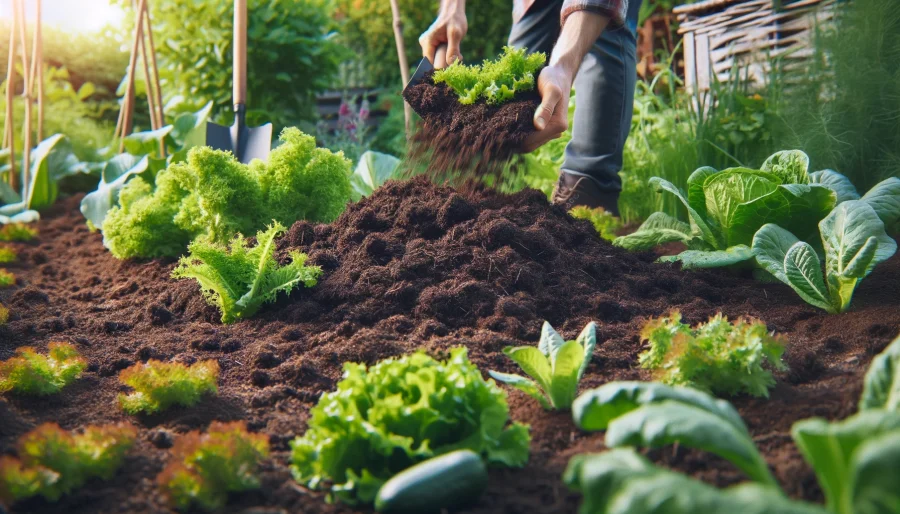This post contains affiliate links. If you buy something from one of our links we may earn a commission. Thanks

What are the benefits of using organic fertilizers for your garden? Discover how they improve soil health, support plant growth, and protect the environment.
Benefits of Using Organic Fertilizers
Key Takeaways:
- What are the benefits of using organic fertilizers?
- They enhance soil structure,
- Provide essential nutrients,
- Support microbial life,
- Reduce environmental impact.
- Organic fertilizers offer a sustainable way to boost plant health and contribute to a healthier ecosystem.
Have you ever wondered what are the benefits of using organic fertilizers in your garden?
These natural alternatives not only nourish your plants but also contribute to a healthier ecosystem.
In this post, we’ll explore the advantages of organic fertilizers and how they can transform your gardening practices.
What are the Benefits of Using Organic Fertilizers?
Organic fertilizers offer numerous benefits for both the environment and agriculture.
They enrich the soil with natural nutrients, support healthy plant growth, and reduce the need for chemical inputs.
By using organic fertilizers, we can promote sustainable agriculture practices that protect our planet and ensure a healthier future for all.
Brief Overview of Organic Fertilizers
Organic fertilizers are made from natural materials like compost, manure, and bone meal.
They provide essential nutrients to plants and improve soil health. Unlike synthetic fertilizers, organic options release nutrients slowly, ensuring a steady supply for plant growth.
Importance of Organic Fertilizers in Sustainable Agriculture
Organic fertilizers play a key role in sustainable agriculture.
They help maintain soil fertility, reduce the use of chemical inputs, and support biodiversity.
By using organic fertilizers, farmers can promote healthier ecosystems and contribute to long-term agricultural sustainability.
DIY Organic Fertilizers

Creating your own organic fertilizers is a cost-effective and accessible way to nourish your garden.
With simple ingredients found at home or locally sourced, you can make nutrient-rich blends that are tailored to your plant’s needs.
This section explores homemade organic fertilizer recipes and their benefits.
Homemade Organic Fertilizer Recipes
Making organic fertilizers at home is easier than you might think.
Common recipes include compost tea, made by steeping compost in water, or a mixture of kitchen scraps, like banana peels and coffee grounds, which are high in potassium and nitrogen.
These natural concoctions provide essential nutrients to your plants without the use of chemicals.
Cost-Effectiveness and Accessibility
One of the biggest advantages of DIY organic fertilizers is their affordability.
Instead of spending money on store-bought products, you can use household waste or inexpensive natural materials.
Additionally, homemade fertilizers are accessible to everyone, regardless of where you live, making it easier to practice sustainable gardening.
Soil Structure
The structure of soil is crucial for plant growth and overall soil health.
Organic fertilizers play a significant role in enhancing soil structure, making it more conducive to plant development.
This section delves into how organic fertilizers improve soil structure and how they compare to chemical fertilizers.
How Organic Fertilizers Improve Soil Structure
Organic fertilizers add organic matter to the soil, which is essential for maintaining a healthy soil structure.
This organic matter helps create a crumbly, well-aerated soil that retains moisture and allows roots to grow freely.
It also promotes the activity of beneficial microorganisms, which further improve soil structure by breaking down organic matter into nutrients that plants can use.
Comparison with Chemical Fertilizers
While chemical fertilizers can provide immediate nutrient boosts, they often neglect soil structure.
Over time, excessive use of chemical fertilizers can lead to soil compaction, reduced aeration, and decreased water retention.
In contrast, organic fertilizers not only provide nutrients but also enhance soil structure, leading to long-term soil health and fertility.
Soil Improvement
Improving soil quality is a key aspect of successful gardening and farming.
Organic fertilizers play a vital role in enhancing soil fertility and overall health.
This section discusses how these natural amendments contribute to soil improvement and the long-term benefits they offer.
Enhancing Soil Fertility and Health

Organic fertilizers, such as compost, manure, and green manures, add essential nutrients to the soil, including nitrogen, phosphorus, and potassium.
They also improve soil structure, increase water retention, and encourage the growth of beneficial microorganisms.
These factors work together to create a fertile and healthy soil environment that supports robust plant growth.
Long-term Benefits for Soil Quality
The use of organic fertilizers offers long-term advantages for soil quality.
Unlike synthetic fertilizers, which can deplete soil nutrients and harm soil biology over time, organic fertilizers enrich the soil and build its fertility with each application.
This sustainable approach leads to healthier soil that can support productive gardens and farms for years to come.
Organic Fertilizer is Eco-Friendly
Choosing organic fertilizers is not only beneficial for plants but also for the environment.
This section explores the environmental advantages of organic fertilizers compared to chemical ones and their role in reducing our carbon footprint.
Environmental Impact of Organic Versus Chemical Fertilizers
Organic fertilizers are derived from natural sources, such as compost, animal manure, and plant residues.
They break down slowly, releasing nutrients gradually and minimizing the risk of nutrient runoff into water bodies.
In contrast, chemical fertilizers can lead to water pollution, soil degradation, and harm to aquatic life.
Organic fertilizers also support soil biodiversity and reduce the reliance on fossil fuel-based products, making them a more sustainable choice.
Contribution to Reducing Carbon Footprint
Using organic fertilizers can help lower your carbon footprint.
The production and transportation of chemical fertilizers are energy-intensive processes that contribute to greenhouse gas emissions.
On the other hand, organic fertilizers often use locally available materials and require less energy to produce.
By enhancing soil carbon sequestration, they also play a role in mitigating climate change, further reducing their environmental impact.
Reduce Fertilizers and Pesticides
Minimizing the use of synthetic fertilizers and pesticides is a key goal of sustainable gardening and farming.
Organic fertilizers can play a significant role in achieving this objective.
This section highlights how organic fertilizers can reduce dependency on synthetic inputs and their positive effects on biodiversity and ecosystems.
Decreased Dependency on Synthetic Inputs
By using organic fertilizers, gardeners and farmers can decrease their reliance on synthetic fertilizers and pesticides.
Organic options provide nutrients in a more natural, slow-release form, reducing the need for frequent chemical applications.
This not only saves costs in the long run but also minimizes the risk of over-fertilization and pesticide resistance.
Positive Effects on Biodiversity and Ecosystems
The use of organic fertilizers supports biodiversity and healthy ecosystems.
Synthetic chemicals can harm beneficial insects, soil microorganisms, and wildlife. In contrast, organic fertilizers nourish the soil and its inhabitants, promoting a balanced ecosystem.
This, in turn, leads to more resilient and productive gardens and agricultural systems.
Advantages of Organic Fertilizers

Organic fertilizers offer a range of benefits that make them a preferred choice for many gardeners and farmers.
This section provides an overview of the key advantages of using organic fertilizers in agriculture and gardening.
Overview of Key Benefits Provided by Organic Fertilizers
- Nutrient Richness: Organic fertilizers contain a wide variety of nutrients essential for plant growth, including macronutrients like nitrogen, phosphorus, and potassium, as well as micronutrients like calcium, magnesium, and sulfur.
- Soil Health: They improve soil structure, increase water retention, and enhance the soil’s ability to hold nutrients, leading to healthier and more productive soils.
- Environmental Safety: Organic fertilizers are environmentally friendly, as they are made from natural materials and do not contain harmful chemicals that can leach into water sources or harm soil organisms.
- Sustainable Agriculture: Using organic fertilizers supports sustainable agriculture practices by reducing dependency on synthetic inputs and promoting biodiversity and soil health.
- Cost-Effectiveness: In the long run, organic fertilizers can be more cost-effective than synthetic ones, as they improve soil health, reducing the need for frequent applications and lowering the overall cost of soil management.
Boosts Plant Health Naturally
Organic fertilizers are a natural way to enhance plant health and growth.
They provide a balanced supply of nutrients that plants need to thrive.
This section explores the role of natural nutrients in plant growth and some examples of nutrient-rich organic fertilizers.
Natural Nutrients and Their Role in Plant Growth
Plants require a range of nutrients for optimal growth, including macronutrients like nitrogen (N), phosphorus (P), and potassium (K), as well as micronutrients like iron (Fe), zinc (Zn), and copper (Cu).
Organic fertilizers release these nutrients slowly, ensuring a steady supply that supports healthy plant development.
They also improve soil structure, which enhances root growth and water retention, further benefiting plant health.
Examples of Nutrient-Rich Organic Fertilizers
- Compost: Made from decomposed organic matter, compost is rich in nutrients and beneficial microorganisms. It improves soil fertility and structure, providing a balanced diet for plants.
- Manure: Animal manure, such as cow, horse, or chicken manure, is a traditional organic fertilizer that supplies a range of nutrients, including nitrogen, phosphorus, and potassium.
- Bone Meal: A byproduct of the meat processing industry, bone meal is high in phosphorus and calcium, essential for strong root development and flowering.
- Seaweed: Seaweed extracts or meals are rich in trace minerals and growth-promoting substances that enhance plant health and resistance to stress.
- Fish Emulsion: Derived from processed fish, fish emulsion is a concentrated liquid fertilizer high in nitrogen, promoting lush, and green growth in plants.
Environmentally Friendly

Organic fertilizers are not only beneficial for plants but also for the environment.
They have a positive impact on water quality and wildlife and play a crucial role in sustainable agriculture practices.
This section delves into these aspects of organic fertilizers.
Impact on Water Quality and Wildlife
Unlike synthetic fertilizers, organic fertilizers are less likely to leach into water bodies and cause pollution.
They release nutrients slowly, reducing the risk of nutrient runoff that can lead to algal blooms and water quality degradation.
Organic fertilizers also support soil health, which helps filter pollutants and prevent soil erosion, further protecting waterways.
By avoiding harsh chemicals, organic fertilizers are safer for wildlife, including beneficial insects, birds, and aquatic life, contributing to a healthier ecosystem.
Role in Sustainable Agriculture Practices
Organic fertilizers are a key component of sustainable agriculture.
They promote soil fertility and biodiversity, reduce the need for chemical inputs, and minimize the environmental footprint of farming.
Sustainable agriculture practices, supported by organic fertilizers, aim to produce food in a way that preserves natural resources, supports biodiversity, and ensures the long-term viability of the agricultural system.
By using organic fertilizers, farmers and gardeners can contribute to a more sustainable and environmentally friendly food production system.
They May Not Provide Enough Nutrients
One common concern about organic fertilizers is that they may not provide sufficient nutrients for optimal plant growth.
This section addresses these concerns and explores ways to supplement organic fertilizers for balanced nutrition.
Addressing Concerns About Nutrient Content in Organic Fertilizers
Organic fertilizers typically release nutrients more slowly than synthetic fertilizers, which can lead to concerns about nutrient availability.
However, this slow-release property is beneficial for long-term soil health and prevents nutrient leaching.
To ensure plants receive adequate nutrients, it’s important to use a diverse range of organic fertilizers and apply them regularly according to soil and plant needs.
Ways to Supplement Organic Fertilizers for Balanced Nutrition
- Diversify Fertilizer Sources: Using a variety of organic fertilizers, such as compost, manure, bone meal, and seaweed, can provide a broad spectrum of nutrients.
- Soil Testing: Regular soil testing can help identify nutrient deficiencies and guide the appropriate application of organic fertilizers.
- Companion Planting: Some plants, like legumes, can fix nitrogen from the air and make it available to other plants, reducing the need for additional fertilization.
- Mulching: Organic mulches, such as straw or wood chips, can decompose over time, adding nutrients to the soil and improving its fertility.
- Green Manures: Planting cover crops, such as clover or vetch, and then plowing them into the soil can add organic matter and nutrients, enhancing soil fertility.
Increased Nutrient Retention in the Soil
One of the key advantages of organic fertilizers is their ability to increase nutrient retention in the soil, reducing nutrient leaching and promoting healthier soil and plant growth.
This section explores how organic fertilizers achieve this and the benefits they bring.
How Organic Fertilizers Reduce Nutrient Leaching
Organic fertilizers release nutrients slowly, as they are broken down by soil microorganisms.
This gradual release ensures that nutrients are available to plants when they need them, rather than being washed away by rain or irrigation.
Additionally, organic matter in these fertilizers improves soil structure, increasing its ability to hold onto nutrients and water, further reducing the risk of leaching.
Benefits for Soil Health and Plant Growth
Increased nutrient retention has several benefits for soil health and plant growth:
- Enhanced Soil Fertility: Retained nutrients contribute to long-term soil fertility, providing a steady supply of essential nutrients for plants.
- Improved Soil Structure: Organic matter from fertilizers improves soil aggregation, promoting better aeration and water infiltration, which is crucial for root development and overall plant health.
- Reduced Need for Fertilization: With nutrients being retained in the soil, there’s less need for frequent fertilization, saving time and resources for gardeners and farmers.
- Sustainable Plant Growth: Plants grown in nutrient-rich soil are generally healthier, more resilient to pests and diseases, and yield better crops.
Microbes Thrive
Soil microbes, including bacteria, fungi, and protozoa, play a crucial role in maintaining soil health and fertility.
Organic fertilizers are instrumental in promoting a thriving soil biome.
This section highlights the importance of microbial activity in the soil and how organic fertilizers support it.
Importance of Microbial Activity in Soil
Microbial activity is essential for various soil functions:
- Nutrient Cycling: Soil microbes break down organic matter, releasing nutrients in forms that plants can absorb.
- Soil Structure: Microorganisms produce substances that bind soil particles together, improving soil structure and water retention.
- Disease Suppression: Beneficial microbes can outcompete or inhibit harmful pathogens, reducing the incidence of soil-borne diseases.
How Organic Fertilizers Promote a Healthy Soil Biome
Organic fertilizers provide food for soil microbes, enhancing their activity and diversity:
- Rich in Organic Matter: Organic fertilizers add organic matter to the soil, serving as a food source for microbes and stimulating their growth.
- Balanced Nutrition: By supplying a range of nutrients, organic fertilizers support a diverse microbial community, which is crucial for soil health.
- Improved Soil Environment: The improved soil structure and moisture retention resulting from organic matter addition create a favorable habitat for microbial life.
More on Organic Fertilizer
Organic fertilizers offer a range of benefits beyond just providing nutrients to plants.
They contribute to a holistic approach to gardening and farming that supports the environment and promotes sustainable practices.
This section explores additional benefits and various types of organic fertilizers.
Additional Benefits of Organic Fertilizers
- Reduced Chemical Runoff: By minimizing the use of synthetic fertilizers, organic fertilizers help prevent chemical runoff that can pollute water bodies and harm aquatic life.
- Carbon Sequestration: Organic fertilizers contribute to carbon sequestration by adding organic matter to the soil, which helps mitigate climate change.
- Enhanced Biodiversity: The use of organic fertilizers supports a diverse range of soil organisms, which in turn contributes to overall ecosystem health.
Types of Organic Fertilizers
- Animal-Based Fertilizers: These include manure, bone meal, blood meal, and fish emulsion, which are rich in nutrients and beneficial for soil health.
- Plant-Based Fertilizers: Examples include compost, green manure, and seaweed extracts, which provide a variety of nutrients and improve soil structure.
- Mineral-Based Fertilizers: These are natural mineral deposits such as rock phosphate and greensand, which supply specific nutrients like phosphorus and potassium.
By understanding the full spectrum of benefits and the different types of organic fertilizers available, gardeners and farmers can make informed choices that support sustainable and healthy agricultural practices.
Safe Environment
Using organic fertilizers is not only beneficial for plants but also ensures a safer environment for humans, animals, and the surrounding ecosystem.
This section highlights the safety aspects of organic fertilizers and how they help avoid health risks associated with chemical fertilizers.
Safety for Humans, Animals, and the Environment
Organic fertilizers are derived from natural materials and are generally considered safe when used properly.
They do not contain synthetic chemicals that can be harmful to human health or wildlife.
Additionally, organic fertilizers support soil health, which is vital for maintaining clean air and water.
Avoiding Health Risks Associated with Chemical Fertilizers
Chemical fertilizers can pose several health risks:
- Contamination of Water Sources: Overuse of chemical fertilizers can lead to nutrient runoff into water bodies, causing pollution and health hazards.
- Soil Degradation: Prolonged use of chemical fertilizers can degrade soil health, leading to increased erosion and reduced agricultural productivity.
- Exposure Risks: Handling and applying chemical fertilizers can expose humans and animals to toxic substances, potentially causing health issues.
By choosing organic fertilizers, gardeners and farmers can mitigate these risks, contributing to a safer and more sustainable environment.
Slow Release of Nutrients
One of the key benefits of organic fertilizers is their slow release of nutrients, which provides a steady supply of essential nutrients to plants over time.
This section explores the advantages of gradual nutrient release for plant health and compares it with the quick-release nature of chemical fertilizers.
Advantages of Gradual Nutrient Release for Plant Health
- Sustained Growth: Slow-release nutrients ensure that plants receive a consistent supply of nutrients throughout their growth cycle, promoting steady and healthy growth.
- Reduced Risk of Overfeeding: With gradual nutrient release, there is less risk of overfeeding plants, which can lead to nutrient burn and other health issues.
- Improved Root Development: Steady nutrient availability encourages deeper and healthier root development, enhancing water and nutrient uptake.
Comparison with Quick-Release Chemical Fertilizers
Chemical fertilizers often provide a quick burst of nutrients, which can lead to rapid growth but also create imbalances:
- Short-Term Effects: Quick-release fertilizers may provide immediate results, but their effects are short-lived, requiring more frequent applications.
- Nutrient Leaching: The rapid release of nutrients increases the risk of leaching, where nutrients are washed away before plants can use them, leading to environmental pollution and wasted resources.
- Soil Health: Unlike organic fertilizers, chemical fertilizers do not contribute to soil organic matter or microbial activity, which are essential for long-term soil health.
In contrast, the slow release of nutrients from organic fertilizers aligns more closely with natural plant growth processes, supporting sustainable and healthy plant development.
Balanced Nutrient Content
Providing plants with a balanced diet is crucial for their overall health and productivity.
Organic fertilizers offer a well-rounded supply of nutrients, ensuring that plants receive everything they need to thrive.
This section discusses the importance of balanced nutrient content in organic fertilizers and the role of nutrient ratios.
Ensuring a Balanced Diet for Plants with Organic Fertilizers
Organic fertilizers typically contain a mix of macro and micronutrients in natural proportions.
This balanced nutrient profile supports various plant functions, from root development to flowering and fruiting.
By using organic fertilizers, gardeners and farmers can provide their plants with a comprehensive diet that promotes healthy growth and resilience against pests and diseases.
Importance of Nutrient Ratios in Organic Fertilizers
The ratio of nutrients in fertilizers, often expressed as N-P-K (nitrogen, phosphorus, potassium), is crucial for plant health.
Each plant has specific nutrient requirements, and the right balance is essential for optimal growth.
Organic fertilizers often have balanced N-P-K ratios that cater to a wide range of plant needs.
Additionally, they provide secondary and micronutrients, such as calcium, magnesium, and iron, which are vital for plant health but often overlooked in synthetic fertilizers.
By paying attention to nutrient ratios, organic fertilizers ensure that plants receive a well-rounded and balanced diet.
Chemical Fertilizers Provide Economic Advantages
While organic fertilizers offer numerous environmental and health benefits, chemical fertilizers are often favored for their economic advantages.
This section discusses the cost considerations and economic impacts of chemical fertilizers and how to balance these with environmental benefits.
Discussing Cost Considerations and Economic Impacts
Chemical fertilizers are typically more concentrated and have a faster impact on plant growth, which can lead to immediate economic gains in terms of crop yield.
They are often less expensive per unit of nutrient than organic options, making them an attractive choice for large-scale agriculture where cost efficiency is a priority.
However, the long-term economic impacts of chemical fertilizer use, such as soil degradation, pollution, and health costs, need to be considered.
Balancing Economic and Environmental Benefits
To achieve a sustainable agricultural system, it’s essential to balance the economic advantages of chemical fertilizers with their environmental impacts.
Integrated nutrient management practices, which combine organic and chemical fertilizers, can offer a solution.
This approach maximizes the benefits of both types of fertilizers, ensuring cost-effectiveness while minimizing environmental harm.
Additionally, investing in organic fertilizer production and research can help reduce costs and make them more competitive with chemical options, leading to a more sustainable and economically viable agricultural system.
Compost

Compost is a cornerstone of organic fertilization, offering a sustainable way to enrich soil and promote plant health.
This section explores the role of compost in organic fertilization and its benefits for soil health and waste reduction.
Role of Compost in Organic Fertilization
Compost is made from decomposed organic materials, such as kitchen scraps, yard waste, and manure.
It is rich in nutrients and beneficial microorganisms, making it an excellent organic fertilizer.
When added to soil, compost provides essential nutrients, improves soil structure, and enhances moisture retention.
It also encourages the growth of beneficial soil organisms, which contribute to nutrient cycling and disease suppression.
Benefits of Composting for Soil Health and Waste Reduction
- Soil Health: Compost improves soil fertility, structure, and aeration, creating a healthy environment for plant roots. It also increases the soil’s water-holding capacity, reducing the need for frequent watering.
- Waste Reduction: Composting diverts organic waste from landfills, where it would otherwise decompose anaerobically and produce methane, a potent greenhouse gas. By turning waste into a valuable resource, composting contributes to a more sustainable and circular economy.
- Carbon Sequestration: Adding compost to soil helps sequester carbon, reducing the atmospheric concentration of carbon dioxide and mitigating climate change.
- Reduced Chemical Use: Using compost as a fertilizer reduces the need for synthetic fertilizers and pesticides, decreasing the environmental footprint of gardening and farming.
Overall, compost is an essential component of organic fertilization, offering multiple benefits for soil health, plant growth, waste management, and environmental sustainability.
Healthy Ecosystem

Organic fertilizers play a crucial role in maintaining a healthy ecosystem.
They contribute to the balance of natural systems and support a diverse range of life forms, including pollinators and beneficial insects.
This section explores how organic fertilizers contribute to ecosystem health and support these important organisms.
Contribution of Organic Fertilizers to Ecosystem Balance

Organic fertilizers add organic matter to the soil, which is essential for a healthy ecosystem.
This organic matter supports soil biodiversity, including bacteria, fungi, and earthworms, which are vital for nutrient cycling and soil structure.
By avoiding synthetic chemicals, organic fertilizers reduce the risk of harming non-target species and help maintain the balance of natural ecosystems.
Supporting Pollinators and Beneficial Insects
- Habitat for Pollinators: Organic fertilizers improve soil health, which in turn supports healthier plants. These healthy plants provide food and habitat for pollinators such as bees, butterflies, and other insects.
- Reduced Pesticide Use: Organic farming practices, which include the use of organic fertilizers, typically involve reduced use of synthetic pesticides. This creates a safer environment for pollinators and beneficial insects, which are often harmed by chemical pesticides.
- Diverse Plant Life: Organic fertilization supports a diverse range of plant life, which is essential for providing nectar and pollen for pollinators throughout the growing season.
By supporting a healthy ecosystem, organic fertilizers contribute to the well-being of pollinators and beneficial insects, which are crucial for plant pollination and natural pest control.
This, in turn, supports biodiversity and the overall health of our environment.
Less Fertilization Required
One of the benefits of using organic fertilizers is that they often require less frequent application compared to synthetic fertilizers.
This is due to their efficiency and the way they contribute to long-term soil health.
This section explores the reduced application frequency of organic fertilizers and the associated cost savings and environmental benefits.
Efficiency of Organic Fertilizers and Reduced Application Frequency
Organic fertilizers release nutrients slowly, matching the natural growth rate of plants.
This slow-release mechanism reduces the need for frequent reapplication, as nutrients remain available in the soil for longer periods.
Additionally, organic fertilizers improve soil structure and microbial activity, which enhances nutrient availability and uptake by plants.
Long-term Cost Savings and Environmental Benefits
- Cost Savings: Although organic fertilizers may initially seem more expensive than synthetic ones, their efficiency and reduced application frequency can lead to long-term cost savings. By improving soil health, organic fertilizers also reduce the need for other soil amendments and pest control measures.
- Environmental Benefits: Using organic fertilizers contributes to environmental sustainability by reducing the risk of nutrient runoff and leaching, which can pollute water bodies. It also supports soil biodiversity and reduces the carbon footprint associated with the production and transportation of synthetic fertilizers.
Overall, the efficiency of organic fertilizers and the reduced need for frequent applications offer both economic and environmental advantages, making them a sustainable choice for gardeners and farmers.
No Leaf or Root Burning
One of the advantages of using organic fertilizers is that they are less likely to cause leaf or root burns compared to synthetic fertilizers.
This section discusses how organic fertilizers provide gentle nourishment to plants and help avoid the damage associated with chemical fertilizer burns.
Avoiding Damage Caused by Chemical Fertilizer Burn
Chemical fertilizers, especially when applied in high concentrations or improperly, can lead to fertilizer burn.
This occurs when excess salts from the fertilizer draw moisture out of plant tissues, causing them to turn brown and dry out.
Organic fertilizers, on the other hand, release nutrients slowly and in lower concentrations, significantly reducing the risk of burning.
Gentle Nourishment with Organic Fertilizers
Organic fertilizers provide a gentle and balanced supply of nutrients to plants.
They contain natural compounds that are less likely to cause harm, even if applied in slightly higher quantities.
Additionally, organic fertilizers improve soil health, which enhances the plant’s ability to absorb and utilize nutrients effectively, further reducing the risk of damage.
This gentle approach ensures that plants receive the nourishment they need without the adverse effects associated with chemical fertilizers.
Not All Products are Created Equally
When it comes to organic fertilizers, there can be significant variations in quality between different products.
Gardeners and farmers need to be aware of these differences to ensure they choose the best option for their plants and soil.
This section explores the quality variations in organic fertilizer products and provides tips for selecting high-quality options.
Quality Variations in Organic Fertilizer Products
The quality of organic fertilizers can vary based on their source materials, processing methods, and nutrient content.
Some products may contain higher levels of beneficial nutrients and organic matter, while others might have more fillers or lower nutrient concentrations.
The presence of contaminants, such as heavy metals or pathogens, can also affect the quality of organic fertilizers.
Tips for Choosing High-Quality Organic Fertilizers
- Check Labels and Certifications: Look for products that are certified organic or have clear labels indicating their nutrient content and source materials.
- Research the Brand: Choose reputable brands known for their quality and transparency in production processes.
- Consider Nutrient Needs: Select fertilizers that match the specific nutrient requirements of your plants and soil.
- Look for Reviews: Read reviews or seek recommendations from other gardeners or agricultural professionals who have experience with the product.
- Test Soil and Adjust: Conduct soil tests to determine nutrient deficiencies and choose fertilizers that address those needs.
By paying attention to these factors, gardeners and farmers can select high-quality organic fertilizers that will effectively support the health and growth of their plants.
Plant Damage Threat Avoided
Using organic fertilizers can significantly reduce the risk of plant damage and disease, promoting healthier and more resilient growth.
This section explores how gentle organic inputs help avoid threats to plant health and support sustainable gardening and farming practices.
Reducing the Risk of Plant Damage and Disease
Organic fertilizers are derived from natural materials and provide nutrients in a form that is easily assimilated by plants.
Unlike synthetic fertilizers, which can sometimes lead to nutrient imbalances or toxic salt buildup in the soil, organic fertilizers promote a balanced soil ecosystem.
This reduces the risk of plant stress, damage, and diseases that can occur when plants are exposed to harsh chemical inputs.
Promoting Healthy Growth with Gentle Organic Inputs
Organic fertilizers not only supply essential nutrients but also enhance soil structure, increase microbial activity, and improve water retention.
These factors contribute to a healthier root environment, allowing plants to absorb nutrients more efficiently and develop stronger root systems.
Strong, healthy plants are better equipped to resist pests and diseases, leading to more vigorous growth and higher yields.
By choosing organic fertilizers, gardeners and farmers can avoid the threat of plant damage and disease, ensuring that their plants grow in a safe and nurturing environment.
Reduced Soil Erosion
Soil erosion is a significant environmental concern that can lead to loss of fertile topsoil, reduced agricultural productivity, and increased pollution in waterways.
Organic fertilizers play a crucial role in preventing soil erosion and promoting soil conservation, which are essential for sustainable land management.
This section explores the role of organic fertilizers in reducing soil erosion and the importance of soil conservation for sustainability.
Role of Organic Fertilizers in Preventing Soil Erosion
Organic fertilizers, such as compost and manure, contribute to soil structure improvement by increasing soil organic matter.
This organic matter helps bind soil particles together, making the soil more resistant to erosion caused by wind and water.
Additionally, the enhanced soil structure improves water infiltration and retention, reducing surface runoff and the potential for soil erosion.
Importance of Soil Conservation for Sustainability
Soil conservation is vital for maintaining healthy ecosystems, ensuring food security, and supporting sustainable agriculture.
By preventing soil erosion, organic fertilizers help preserve soil fertility, protect water quality, and reduce the need for chemical inputs.
This contributes to a more sustainable and resilient agricultural system that can support future generations.
Overall, the use of organic fertilizers is a key strategy in reducing soil erosion and promoting soil conservation, both of which are crucial for sustainable environmental and agricultural practices.
What are the Benefits of Using Organic Fertilizers? FAQs
Organic fertilizers offer a range of benefits for both the environment and plant health.
However, there are common questions about their use and effectiveness.
In this section, we’ll address some frequently asked questions about organic fertilizers to provide a better understanding of their advantages.
Q. What are the 5 benefits of using organic fertilizer?
A. The five key benefits of using organic fertilizer are:
- Improved soil health and structure
- Slow and steady nutrient release
- Enhanced biodiversity and ecosystem balance
- Reduced risk of chemical runoff and pollution
- Safer for humans, animals, and the environment
Q. What are the pros and cons of organic fertilizer?
A. Pros of organic fertilizer include improved soil health, environmental safety, and support for sustainable agriculture.
Cons may include slower nutrient release, potential for nutrient imbalances, and higher initial costs compared to synthetic fertilizers.
Q. Why are organic fertilizers good for the environment?
A. Organic fertilizers are good for the environment because they are made from natural materials, reduce the need for chemical inputs, support soil biodiversity, and minimize the risk of water pollution.
Q. How do organic fertilizers promote healthy plant growth?
A. Organic fertilizers promote healthy plant growth by providing a balanced supply of nutrients, improving soil structure, and supporting beneficial microbial activity in the soil.
Q. Can organic fertilizers be used for all types of plants?
A. Yes, organic fertilizers can be used for a wide range of plants, including vegetables, fruits, flowers, and lawns. However, it’s important to choose the right type of organic fertilizer based on the specific needs of the plants.
By understanding these aspects of organic fertilizers, gardeners and farmers can make informed decisions that support healthy plant growth and environmental sustainability.
What are the Benefits of Using Organic Fertilizers? Conclusion
Organic fertilizers offer a host of benefits that make them an excellent choice for gardeners and farmers who are committed to sustainable agriculture.
Summarizing the Key Benefits of Using Organic Fertilizers
Organic fertilizers offer numerous advantages for soil health, plant growth, and environmental sustainability.
Here are some benefits of using organic fertilizers
- They improve soil structure,
- provide a balanced supply of nutrients,
- support beneficial soil microorganisms,
- and reduce the risk of chemical runoff.
- By using organic fertilizers, we can enhance the overall health and productivity of our gardens and farms.
Encouraging the Adoption of Organic Fertilizers for Sustainable Agriculture
Adopting organic fertilizers is a crucial step toward sustainable agriculture.
They help preserve natural resources, protect biodiversity, and promote ecological balance.
By choosing organic options, we can contribute to a healthier environment and ensure a sustainable future for agriculture.
Let’s embrace the benefits of organic fertilizers and work together to create a greener, more sustainable world.
Learn more in our article: Eco-Friendly Gardening
Resources for Organic Fertilizers
Interested in learning more about organic fertilizers and their benefits?
Explore these articles and books to deepen your understanding of organic fertilization practices, soil health, and sustainable gardening.
These resources offer valuable insights and practical tips for gardeners and farmers looking to enhance their use of organic fertilizers.
Articles:
- Penn State Extension – Organic Fertilizers: Types, Production, and Environmental Impact: Using Organic Nutrient Sources – This article discusses various organic nutrient sources, including their benefits and considerations for use in organic farming.
- Oregon State University Extension Service – Using Organic Fertilizers in the Home Garden: Read more
- Penn State Extension Understanding Soil Fertility – This article provides an overview of soil fertility, including the role of organic matter and the importance of nutrient balance.
- University of Missouri Extension – Organic Fertilizer Guide: What to Use and How to Use It: Soil Management in Home Gardens and Landscapes – This article offers insights into soil management practices for home gardens and landscapes, with a focus on the use of organic fertilizers.
- USDA Agricultural Research Service – The Role of Organic Fertilizers in Sustainable Agriculture:
- UMass Extension Vegetable Program – Organic Fertilizer and Soil Amendments: Fact Sheets – Soil & Nutrient Management | Center for Agriculture, Food, and the Environment at UMass Amherst
Related Books:
The Organic Gardener’s Handbook of Natural Pest and Disease Control: A Complete Guide to Maintaining a Healthy Garden and Yard the Earth-Friendly Way Available on Amazon
Teaming with Microbes: The Organic Gardener’s Guide to the Soil Food Web by Jeff Lowenfels and Wayne Lewis Available on Amazon
The Rodale Book of Composting: Easy Methods for Every Gardener by Deborah L. Martin and Grace Gershuny Available on Amazon
Building Soils Naturally: Innovative Methods for Organic Gardeners by Phil Nauta Available on Amazon
These resources provide valuable information on the types, production, and environmental impact of organic fertilizers, as well as practical guides on how to use them effectively in gardening and agriculture.















